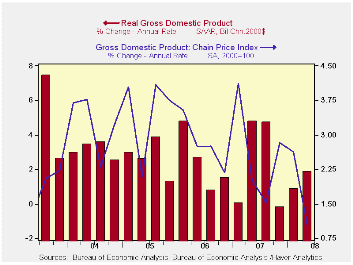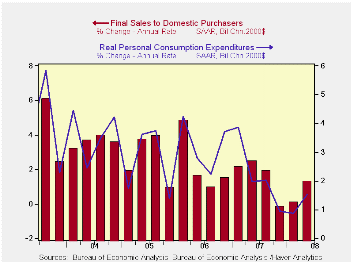 Global| Jul 31 2008
Global| Jul 31 2008U.S. 2Q'08 GDP Growth Improved Due to Foreign Trade
by:Tom Moeller
|in:Economy in Brief
Summary
U.S. real GDP growth last quarter improved to 1.9% from 0.9% during 1Q and from the small decline (revised from a slight increase) during 4Q'07. In addition, growth last year and during 2006 was revised down by 0.2 percentage points [...]

U.S. real GDP growth last quarter improved to 1.9% from 0.9% during 1Q and from the small decline (revised from a slight increase) during 4Q'07. In addition, growth last year and during 2006 was revised down by 0.2 percentage points to 2.0% and 2.8%. Growth last quarter fell short of Consensus expectations for a 2.2% rate of increase.
Corporate profits were not available for 2Q but the rate of change during 1Q was revised down to -4.3% (-1.5% y/y) from -1.3%. An improved foreign trade deficit added 2.4 percentage points to GDP growth. That was the largest addition since the third quarter of 1980. Exports grew at a strong 9.2% annual rate. The 10.2% y/y growth rate matched that of the prior three quarters. Growth in imports was negative for the third consecutive quarter at -6.6% (-1.7% y/y) and that was the steepest quarterly rate of decline since the recession year of 2001.Inventory decumulation offset much of the addition from trade and reduced 2Q GDP growth by 1.9 percentage points. That was the largest subtraction in three years.
Growth in final sales to domestic purchasers improved to a still moderate 1.3% from an unrevised 0.1% during 1Q. The y/y growth rate of 0.8% was the weakest since late in 1991.
Growth in business fixed investment held steady with 1Q at a 2.3% rate (4.2% y/y). These latest rates of growth are down sharply from 4.9% increases last year and growth above 7.0% during 2006 and 2005. Last quarter, equipment investment fell at a 3.4% (0.1% y/y) rate while structures investment jumped at a 14.3% (12.9% y/y) rate.
The GDP chain price index grew at a 1.1% rate which was less than half the Consensus expectation for a 2.6% rise. The small increase was due to a 2.2% rate of decline in residential investment prices. The PCE price index grew at an accelerated 4.2% (3.7% y/y) rate.
| Chained 2000$, % AR | 2Q '08 | 1Q '08 | 4Q '07 | 2Q Y/Y | 2007 | 2006 | 2005 |
|---|---|---|---|---|---|---|---|
| GDP | 1.9 | 0.9 | -0.2 | 1.8 | 2.0 | 2.8 | 2.9 |
| Inventory Effect | -1.9 | -0.0 | -1.0 | -0.6 | -0.4 | 0.0 | -0.2 |
| Final Sales | 3.9 | 0.9 | 0.8 | 2.4 | 2.4 | 2.8 | 3.1 |
| Foreign Trade Effect | 2.4 | 0.8 | 0.9 | 1.6 | 0.6 | 0.2 | 0.0 |
| Domestic Final Demand | 1.3 | 0.1 | -0.1 | 0.8 | 1.8 | 2.6 | 3.1 |
| Chained GDP Price Index | 1.1 | 2.6 | 2.8 | 2.0 | 2.7 | 3.2 | 3.3 |
Tom Moeller
AuthorMore in Author Profile »Prior to joining Haver Analytics in 2000, Mr. Moeller worked as the Economist at Chancellor Capital Management from 1985 to 1999. There, he developed comprehensive economic forecasts and interpreted economic data for equity and fixed income portfolio managers. Also at Chancellor, Mr. Moeller worked as an equity analyst and was responsible for researching and rating companies in the economically sensitive automobile and housing industries for investment in Chancellor’s equity portfolio. Prior to joining Chancellor, Mr. Moeller was an Economist at Citibank from 1979 to 1984. He also analyzed pricing behavior in the metals industry for the Council on Wage and Price Stability in Washington, D.C. In 1999, Mr. Moeller received the award for most accurate forecast from the Forecasters' Club of New York. From 1990 to 1992 he was President of the New York Association for Business Economists. Mr. Moeller earned an M.B.A. in Finance from Fordham University, where he graduated in 1987. He holds a Bachelor of Arts in Economics from George Washington University.
More Economy in Brief
 Global| Feb 05 2026
Global| Feb 05 2026Charts of the Week: Balanced Policy, Resilient Data and AI Narratives
by:Andrew Cates






